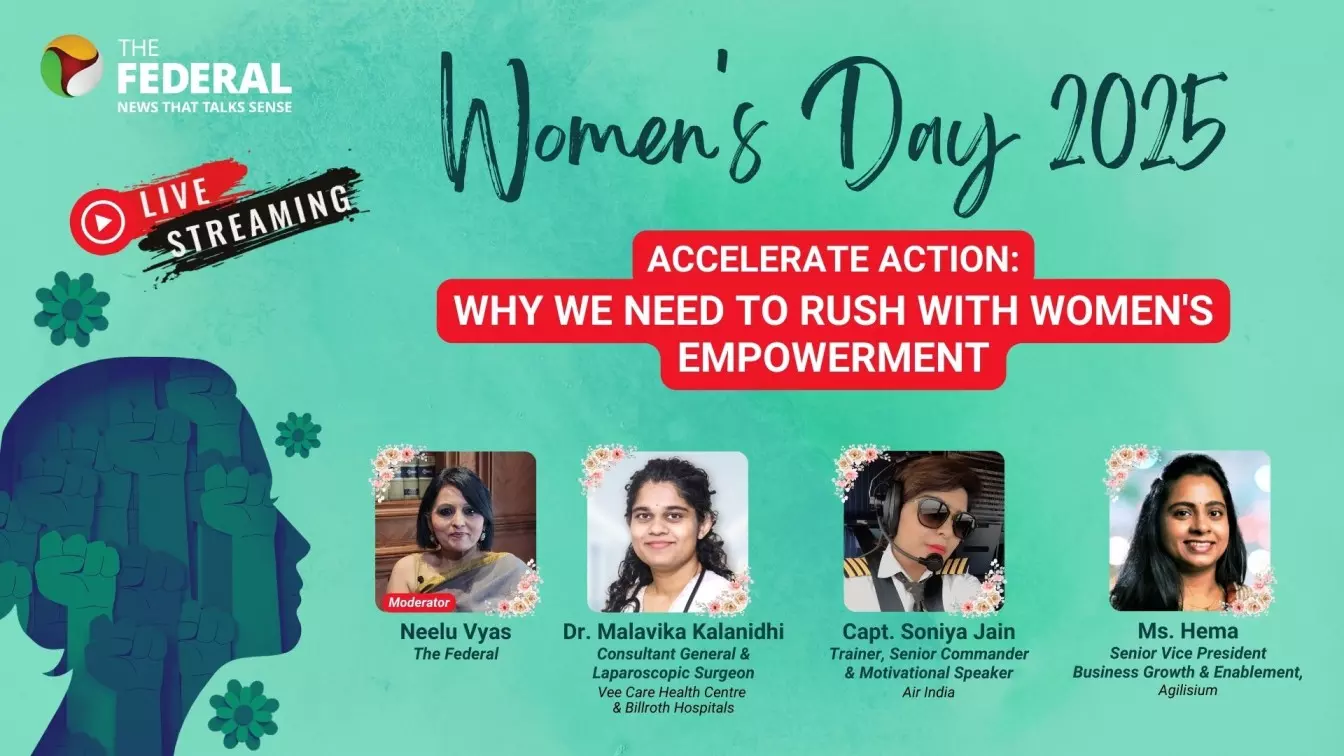
Women's Day | Accelerate Action: Why we need to rush with women's empowerment
Can Indian women truly increase the momentum and urgency in addressing the systemic barriers and biases they face, both in personal and professional spheres?

How can gender parity be achieved faster? Experts weigh in on women’s empowerment across industries.
Chennai, India – On the occasion of International Women’s Day 2025, The Federal hosted a thought-provoking live webinar featuring Captain Sonia Jain (Commander & Trainer Pilot, Air India), Dr. Malavika Kalanidhi (General & Laparoscopic Surgeon), and Hemapriya Darshini (Senior VP, Business Growth & Enablement, Agilisium). Moderated by Neelu Vyas, the discussion focused on how women’s empowerment can be accelerated across different fields, the systemic challenges they face, and actionable solutions to bridge the gender gap.
Parity begins at home
The session began with a compelling statement from Captain Sonia Jain, emphasizing that empowerment starts at home.
"Charity begins at home, and so does parity. Women must first recognize their own worth, embrace self-love, and raise their sons with the right values," said Captain Jain.
She highlighted how shared responsibilities within households can create a ripple effect on societal change. She also called for workplace policies like childcare support, leadership roles for women, and shared parenting responsibilities for men to build a more inclusive environment.
Women in aviation: Breaking barriers but still struggling for leadership roles
Captain Jain shared her personal journey in aviation, a male-dominated field.
"When I joined Air India in 2006, only 8% of pilots were women. Today, India leads the world with 15% female pilots. Yet, leadership positions are still male-dominated," she noted.
She expressed her aspiration to reach a top management role within five years, bringing more women into decision-making positions alongside her. However, she acknowledged the challenges of work-life balance, particularly managing family responsibilities while working long-haul flights.
"Men can return home after a long flight and sleep, but a woman often has to catch up on family duties immediately. It’s an ongoing challenge," she added.
The gender gap in healthcare: Women neglecting their own health
Dr. Malavika Kalanidhi, a general surgeon specializing in breast surgery and laser proctology, highlighted the dire consequences of women prioritizing family over personal health.
She shared a heartbreaking case of a 46-year-old woman who delayed seeking medical help for a breast lump due to societal pressure and stigma. By the time she finally consulted a doctor, the cancer had spread, making treatment more complex.
"Women are conditioned to put their families first, even at the cost of their health. They must be educated to prioritize their well-being," she stressed.
She also called for corporate policies mandating regular health screenings for women employees, emphasizing that preventive healthcare can save lives.
Corporate India: Gender parity beyond tokenism
Hemapriya Darshini, a senior executive at Agilisium, tackled the systemic barriers in corporate India.
"Women make up 48% of STEM graduates, yet only 14% hold leadership positions. The gap is not due to a lack of talent, but due to ingrained biases in promotion and hiring practices," she pointed out.
She emphasized the need for data-driven decision-making in companies, using AI and analytics to track promotion patterns and ensure fair opportunities for women.
"Just look at the data. If fewer women are getting promotions, it’s not about competence, but bias. Organizations must be held accountable," she said.
An emotional moment: The power of small encouragements
The discussion took an emotional turn when host Neelu Vyas teared up while sharing a personal story.
She recounted how her former cook, a woman struggling with financial and family pressures, refused to send her daughter to work as a domestic help. Instead, she prioritized her education against all odds.
"I kept encouraging her to educate her daughter. Just three days ago, I got a call—her daughter has cleared her MBBS exams and is now a doctor. I was in tears," Neelu shared.
The story resonated deeply with the panel, reinforcing the idea that small encouragements can transform lives.
Rushing towards empowerment: What needs to change?
The discussion concluded with actionable solutions to accelerate gender parity:
Shared responsibilities: Encourage men to take equal roles in household duties.
Workplace policies: More childcare support, leadership programs, and mentorship for women.
Healthcare focus: Mandatory screenings and awareness programs for working women.
Data accountability: Companies must track gender diversity metrics and address biases.
Breaking stereotypes: Women should take risks, hold leadership positions, and challenge norms.
Women’s Day should be every day
As the webinar wrapped up, the panelists agreed that empowerment isn’t about a single day—it’s about continuous action.
"Every woman is special every day. Women’s empowerment needs to happen at scale, with speed, and across all levels—family, society, and government," said Neelu Vyas.
The data from the World Economic Forum states that full gender parity will take until 2158. The panel urged that this timeline must be shortened through collective effort and bold action.
The content above has been generated using a fine-tuned AI model. To ensure accuracy, quality, and editorial integrity, we employ a Human-In-The-Loop (HITL) process. While AI assists in creating the initial draft, our experienced editorial team carefully reviews, edits, and refines the content before publication. At The Federal, we combine the efficiency of AI with the expertise of human editors to deliver reliable and insightful journalism.

